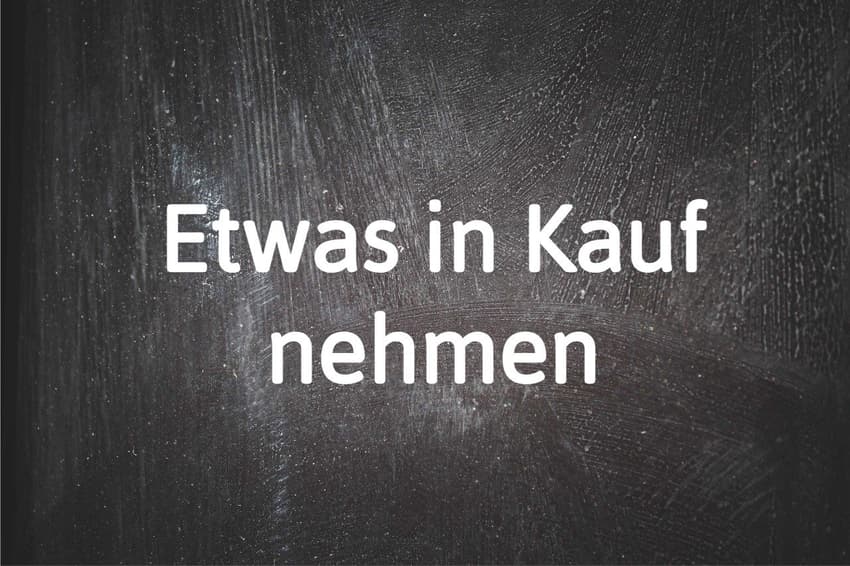German phrase of the day: Etwas in Kauf nehmen

Leave it to the German language to help with any situation that involves a trade-off between two things.
Why do I need to know this phrase?
This is one of the most common German language idioms, which pops up just as frequently in colloquial chats as in political debates and news broadcasts across the German-speaking world.
What does it mean?
The phrase literally translates as "to take something in the purchase". But its usage goes far beyond commercial transactions: essentially it means that, in order to get something you really want, you have to accept something less-than-ideal in return.
Let's say you get the chance to be a participant on a show like Game of Switzerland (which sees four pairs complete a scavenger hunt through Switzerland in three days for the main prize of 30,000 Swiss francs) - on the same night as your best friend's birthday bash which you've been planning for weeks. You might have to take it in Kauf that you'll miss the festivities.
READ ALSO: Swiss German vs Hochdeutsch: What are the main differences?
In the political dimension, the phrase is often used to argue that, in order to implement a beneficial measure - be it more reliable public transport or energy rebates - a less desired consequence, such as raising taxes, will be part of the deal.
And the phrase frequently arises in debates around the ethics of technology: some say, for example, that self-driving cars will ultimately save lives, even if there are a few crashes before the AI behind them is perfected.
Essentially it's a trade-off of two things, with a person arguing (or at least accepting) that the good outweighs the inevitable bad.
Where does the phrase come from?
Originally the phrase was used to refer to something a person receives in addition to what they have already bought. It then came to refer to the bad goods that a merchant wanted to get rid of along with the desired purchase.
Examples of how it's used:
Dieses Risiko kann ich in Kauf nehmen.
I can accept this risk.
Bei diesen preisgünstigeren Geräten müssen Nutzer aber eine niedrigere Rechenleistung in Kauf nehmen.
But with these lower-priced devices, the user must take into account the lower processing power.
READ ALSO: Five Swiss German phrases to make you sound like a local
Comments
See Also
Why do I need to know this phrase?
This is one of the most common German language idioms, which pops up just as frequently in colloquial chats as in political debates and news broadcasts across the German-speaking world.
What does it mean?
The phrase literally translates as "to take something in the purchase". But its usage goes far beyond commercial transactions: essentially it means that, in order to get something you really want, you have to accept something less-than-ideal in return.
Let's say you get the chance to be a participant on a show like Game of Switzerland (which sees four pairs complete a scavenger hunt through Switzerland in three days for the main prize of 30,000 Swiss francs) - on the same night as your best friend's birthday bash which you've been planning for weeks. You might have to take it in Kauf that you'll miss the festivities.
READ ALSO: Swiss German vs Hochdeutsch: What are the main differences?
In the political dimension, the phrase is often used to argue that, in order to implement a beneficial measure - be it more reliable public transport or energy rebates - a less desired consequence, such as raising taxes, will be part of the deal.
And the phrase frequently arises in debates around the ethics of technology: some say, for example, that self-driving cars will ultimately save lives, even if there are a few crashes before the AI behind them is perfected.
Essentially it's a trade-off of two things, with a person arguing (or at least accepting) that the good outweighs the inevitable bad.
Where does the phrase come from?
Originally the phrase was used to refer to something a person receives in addition to what they have already bought. It then came to refer to the bad goods that a merchant wanted to get rid of along with the desired purchase.
Examples of how it's used:
Dieses Risiko kann ich in Kauf nehmen.
I can accept this risk.
Bei diesen preisgünstigeren Geräten müssen Nutzer aber eine niedrigere Rechenleistung in Kauf nehmen.
But with these lower-priced devices, the user must take into account the lower processing power.
READ ALSO: Five Swiss German phrases to make you sound like a local
Join the conversation in our comments section below. Share your own views and experience and if you have a question or suggestion for our journalists then email us at [email protected].
Please keep comments civil, constructive and on topic – and make sure to read our terms of use before getting involved.
Please log in here to leave a comment.